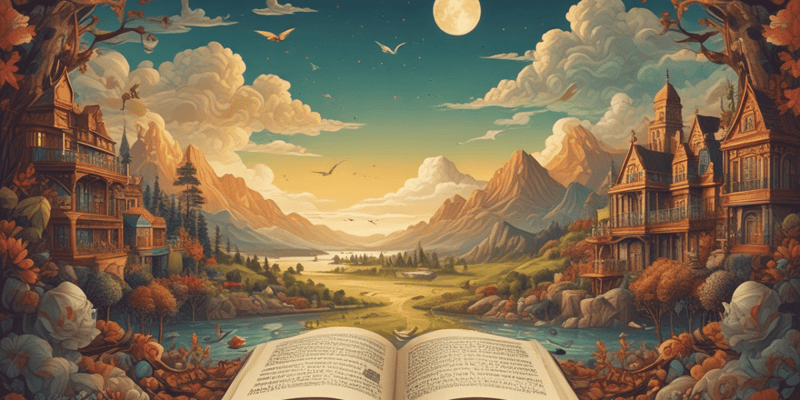Questions and Answers
What is the main purpose of literature?
To entertain and engage readers
Which of the following is an example of nonfiction?
Albert Einstein's biography
What is the primary characteristic of a comedy drama?
It has a happy ending
Which of the following is a subgenre of fiction?
Signup and view all the answers
What is the primary characteristic of realistic fiction?
Signup and view all the answers
What is the primary characteristic of a tragedy drama?
Signup and view all the answers
Which of the following is an example of poetry?
Signup and view all the answers
What is the primary characteristic of historical fiction?
Signup and view all the answers
Which of the following is a subgenre of nonfiction?
Signup and view all the answers
What is the primary characteristic of science fiction?
Signup and view all the answers
Study Notes
Definition of Literature and Literary Genres
- Literature refers to books and other writings, usually by expert authors.
- A literary genre is a type or category of literature, divided into four main genres: drama, fiction, nonfiction, and poetry.
Main Literary Genres
- Drama: a play for theater, told by character dialogue or talking; can be read or watched.
- Fiction: a story that did not actually happen in real life; example: Twilight (vampire story).
- Nonfiction: writing that is real and factual or that actually happened; example: textbooks (science, history).
- Poetry: writing using language and sounds in special ways to express ideas; example: "The rose is red..." (rhyming verses).
Subgenres of Drama
- Comedy: a funny or humorous drama with a happy ending; example: The Comedy of Errors by Shakespeare.
- Tragedy: a sad drama with a sad ending; example: Romeo and Juliet by Shakespeare.
Subgenres of Fiction
- Fantasy: a story in a fantasy world or a world that isn't real; example: Harry Potter books.
- Folklore: old cultural stories, including fairytales, fables, myths, legends, and tall tales; example: Russian folklore (Baba Yaga) and Mexican folklore (La Llorona).
- Historical Fiction: a fiction story based on real history; example: Gone with the Wind by Margaret Mitchell.
- Mystery: a story about a crime; example: And Then She Was Gone (detectives trying to find a missing girl).
- Realistic Fiction: a story that seems real but isn't real; example: Jane Eyre by Charlotte Brontë.
- Romance: a love story; example: A Perfect Gentleman.
- Science Fiction: a story in the future with advanced technology; example: The Hunger Games by Suzanne Collins.
- Thriller/Suspense: a story that makes readers nervous, excited, or scared; example: The Girl With No Past by Kathryn Croft.
Subgenres of Nonfiction
- Biography: a story of a person's life; example: Albert Einstein's biography by Walter Isaacson.
- Autobiography: a story written by the author about himself or herself; example: The Autobiography of Benjamin Franklin.
- Narrative Nonfiction: a story or narrative that happened in real life; example: Turn Right at Machu Picchu by Mark Adams.
- Periodicals: magazines, newspapers, and journals written regularly; example: daily newspaper.
- Reference Materials: books with facts in alphabetical order; example: dictionary, thesaurus, encyclopedia.
Subgenres of Poetry
- Lyric: a poem about the speaker's thoughts; example: haiku by a famous haiku writer.
- Narrative Poetry: a poem that tells a story; example: epic poem Beowulf.
- Dramatic Poetry: words spoken by a character; example: soliloquy, dialogue, monologue in plays like Romeo and Juliet.
Definition of Literature and Literary Genres
- Literature refers to books and other writings, usually by expert authors.
- Literary genres are categories of literature, divided into four main genres.
Main Literary Genres
- Drama: a play for theater, told through character dialogue.
- Fiction: a story that did not actually happen in real life.
- Nonfiction: writing that is real and factual or that actually happened.
- Poetry: writing that uses language and sounds in special ways to express ideas.
Subgenres of Drama
- Comedy: a funny or humorous drama with a happy ending.
- Tragedy: a sad drama with a sad ending.
Subgenres of Fiction
- Fantasy: a story in a fantasy world or a world that isn't real.
- Folklore: old cultural stories, including fairytales, fables, myths, legends, and tall tales.
- Historical Fiction: a fiction story based on real history.
- Mystery: a story about a crime.
- Realistic Fiction: a story that seems real but isn't real.
- Romance: a love story.
- Science Fiction: a story in the future with advanced technology.
- Thriller/Suspense: a story that makes readers nervous, excited, or scared.
Subgenres of Nonfiction
- Biography: a story of a person's life.
- Autobiography: a story written by the author about himself or herself.
- Narrative Nonfiction: a story or narrative that happened in real life.
- Periodicals: magazines, newspapers, and journals written regularly.
- Reference Materials: books with facts in alphabetical order.
Subgenres of Poetry
- Lyric: a poem about the speaker's thoughts.
- Narrative Poetry: a poem that tells a story.
- Dramatic Poetry: words spoken by a character.
Studying That Suits You
Use AI to generate personalized quizzes and flashcards to suit your learning preferences.
Description
Learn about the definition of literature and its main genres, including drama, fiction, nonfiction, and poetry. Understand the characteristics of each genre and how they differ from one another.




